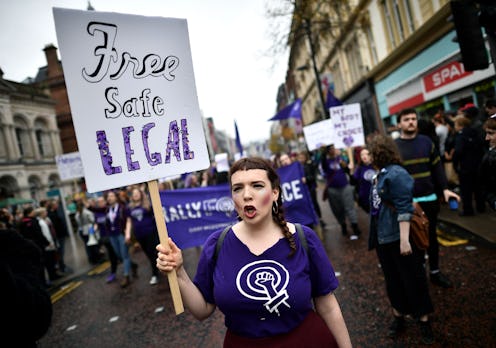News
Ireland's Abortion Vote May Be Flooded With Bots & Fake Ads — Just Like The 2016 Election

On May 25, the nation of Ireland will be voting on a historic referendum on whether or not to repeal the country's constitutional amendment outlawing abortion. But now, as MarketWatch detailed, some supporters of Ireland's upcoming abortion referendum are worried that bots and anonymous ads on social media are being used to fight back by its opponents.
These sorts of electoral tactics would not be new, as they were reportedly employed in a major vote in the United Kingdom during the run-up to 2016's Brexit vote, in which British voters opted to withdraw from the European Union. Many thousands of social media bots, some reportedly of Russian origin, helped amplify the pro-Brexit message before and after the vote took place.
During the 2016 U.S. presidential election, social media bots of Russian origin also reportedly mobilized in a big way in support of the Republican candidate, Donald Trump. According to Newsweek, Russian bots tweeted in support of Trump a staggering 500,000 during the 2016 election, helping to build and amplify the narratives and themes that powered his candidacy. In all, it's been reported that some 120 million Americans may have been exposed to Russian-originated political content during the race.
In January 2018, Twitter claimed that only one percent of a pro-Brexit bot network on its platform had been Russian in origin. But regardless of the country such efforts originate from, using social media bots and anonymous ads to project a particular political message is clearly a calculated style of campaigning in the modern age. And, as Wired detailed in March, those same tactics ― as well as Facebook ad content produced by unknown and anonymous sources ― appears to be rearing its head again in Ireland's abortion debate.
The stakes for the women of Ireland in the referendum are huge, although it's worth noting that not all of them support the repeal. In March, as the Irish Times detailed, polling showed 66 percent of the country's women support either repealing or replacing the constitutional amendment, so to enabling more moderate, reformist policy-making on abortion.
The eighth amendment became part of the Irish constitution back in 1983, and its language has effectively outlawed abortion for decades. The text of the amendment is as follows:
The State acknowledges the right to life of the unborn and, with due regard to the equal right to life of the mother, guarantees in its laws to respect, and, as far as practicable, by its laws to defend and vindicate that right.
The upshot is that the Irish state is constitutionally bound to view an unborn fetus as having an equal right to life as its mother, thereby placing heavy clamps on women's reproductive freedoms in the country. If Ireland votes to repeal the amendment, then the country's legislature will have the ability to craft new laws on the issue.
As MarketWatch detailed in its report on the presence of bots in the referendum campaign, David Quinn, the head of a conservative, Catholic, and pointedly anti-abortion organization called the Iona Institute, dismissed concerns over anonymous advertising on Facebook and other social media platforms. Rather, he portrayed them as a way for anti-abortion activists to get their message out without the mainstream media.
"Of course mainstream media dislike social-media advertising by pro-lifers,” Quinn said in a tweet. ”Such ads are a way of doing an end-run around media bias."
Google, for its part, has announced that neither it nor YouTube, which it owns, will run any political ads relating to the referendum. Facebook has also weighed in on the situation, announcing that it will not allow any ads relating to the referendum that are purchased by entities or groups located outside of Ireland. Irish law, as The Guardian notes, explicitly prohibits political donations by foreign entities.
This still leaves open the possibility of domestically-funded ads playing a role in the outcome of the race, but would preclude the sorts of allegations of undue foreign influence that arose during the Brexit campaign, as well as the 2016 U.S. presidential campaign. The Irish referendum vote will be taking place on May 25.